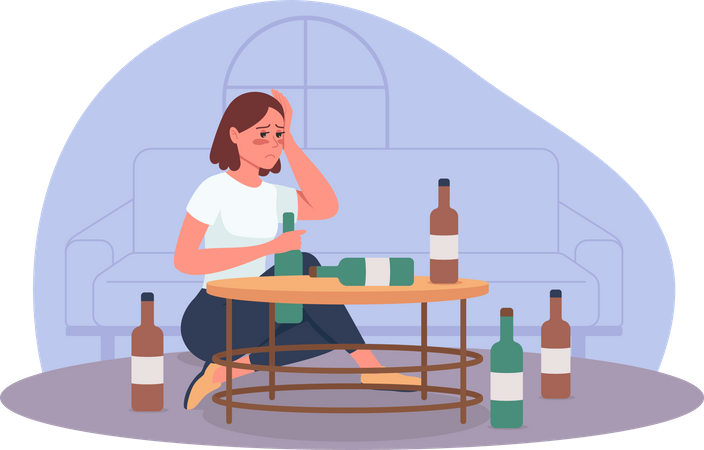There are millions of individuals who turn out to be alcoholics. Though moderate alcohol consumption does not harm the health, excessive intake could make normal life difficult. Alcoholism is known to cause many problems. When you want to quit drinking you could experience alcohol withdrawal symptoms. The heavy drinking signs could lead to cancer, liver and brain diseases.
So what are these symptoms and why do they occur after you stop use of this substance. There are many people who may not even experience noticeable change after they stop drinking. Few do suffer problems as their bodies react strongly to less alcohol.
Most people engage in drinking activities on regular basis now. Social presence does require light drinking, but it should not affect your family or personal life. The addiction to alcohol can bring many problems as the occasional pleasure becomes a life threatening addiction.
The addiction may not always be prominent, so how do you know you are habituated to drinking. With simple comparison of all the mentioned symptoms here will give you better clues about the condition. The addiction to alcohol has been ruining many lives, though the symptoms are short lived, living with the condition can be traumatic. You need a treatment program or rehabilitation assistance to take care of the alcohol withdrawal symptoms.
The constant intake of alcohol doses makes your system accustomed to the drinks. You start experiencing pain and discomfort when you are not drinking. Some possible alcohol withdrawal symptoms can range from mild to moderate. Some of the psychological and physical symptoms are mentioned below:
- Nervousness or jumpy feeling
- Anxiety and depression
- Irritability or excitement spontaneously
- Bad dreams or nightmares
- Difficulty in clear thinking
- Rapid changes emotionally
If you are experiencing some of the problems discussed here, talk to your counselor or doctor for assistance. Blaming the symptoms to stress or other disorders will not help you in getting rid of them quickly. Mild to moderate symptoms you experience physically:
- Headache
- Shakiness with fatigue
- Clammy skin and pallor or discoloration from skin
- Sweating with loss of appetite
- Insomnia and trouble sleeping
- Enlarged pupils
- Tremor experienced in parts of body
- Increased heart rate
If you experience these symptoms it is time to see a doctor. The signs of alcohol withdrawal symptoms could even include seizures that may lead to death. The severe symptoms are as follows:
Agitation is an unpleasant state involving tension, arousal and irritability as common symptom. There can be fever, delirium and a state of high confusion level with visual hallucinations. Seizures and physical change in behavior or activity could result due to abnormal functioning of the brain.
This condition may improve if you are being assisted to handle the withdrawal symptoms or even have prolonged bouts of these alcohol withdrawal symptoms. There can be experiences lasting for a year or more after you quit drinking. In extreme cases you may have the following symptoms:
- Alcohol craving at intense levels
- Sensorium clouding
- Inability to experience pleasure from regular activities
- Disorientation
- Insomnia along with headache
- You can experience vomiting and nausea
The gradual decrease in your binge drinking sessions is more preferred as compared to the sudden withdrawal of drinks. You may seek help and treatment to get rid of the alcohol withdrawal symptoms.
The treatment time and even the place you get treated could be kept confidential. There are treatment centers to let you find a cure in close quarters under an anonymous name. The best thing is to call a center close to your home.
Go to a detox center at the earliest. You can experience the alcohol withdrawal symptoms and obtain medical treatment at the earliest. Constant monitoring and medication for the unpleasant feelings can easily be handled with comfort if you have support.
Steps to freedom from alcohol withdrawal
Getting diagnosed for the symptoms of alcohol withdrawal is the first step to successful treatment. Start with the comparison of symptoms. All the physiological, biological and psychological symptoms must match to get treatment. Make sure you are seeking assistance before it affects your career and personal relationship. The lab tests will determine levels of damage due to alcohol. Refrain from alcohol to improve your withdrawal symptoms. Medical intervention is important to get the treatment for alcohol withdrawal.
The physical alcohol withdrawal symptoms are known to be become extreme and so medical intervention can provide some relief from these complications. There are many counseling sessions that allow you to get more assistance with the mental and emotional wellbeing. The withdrawal symptoms can use some counseling to understand the root cause of the disorder. You could go through variety of emotional turmoil involving career, social or family problems as you struggle with recovery. Group therapy sessions or even one on one form of counseling can help in recovery.
With some aftercare and precautionary measures you can get the support and recover quickly. It is possible to quit alcohol addiction and be a part of the commoners with alcohol free lifestyle. You can actually lead a normal life as you practice the tips you learn during the counseling and rehabilitation. Set goals and your personal issues will be sorted as you progress towards recovery.

